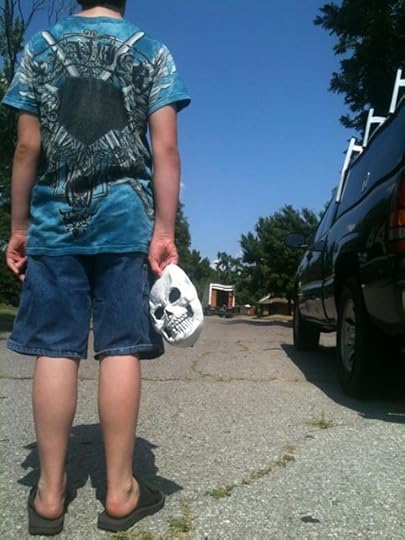This Week in Word of the Day – 7/14/2003

edacity \ih-DAS-i-tee\, noun:
the state of being edacious; voraciousness; appetite.
They collided into one another with ravenous edacity, two desperate bodies falling into each other’s lonely orbits. Within the vast, dark void, the crash erupted with light, heat, chaos.
Both bodies finally pealed off one another, returning to their orbits, hobbled, altered. They awaited the moment that their paths would intersect again and, God-willing, they would fuse, ignite, and burn as an eternal sun.
layette \ley-ET\, noun:
an outfit of clothing, bedding, etc., for a newborn baby.
He knew they couldn’t keep the baby. The two of them, so selfish, so scared. Adoption was the right thing. The baby deserved happiness.
Hoping to dissuade them, his in-laws arrived with a crib, something called a “diaper genie”, a matching layette – pale blue because the doctor let slip the baby was a boy. The doctor knew they were giving the baby up too. She was devastated and spent the rest of the day holding her round belly and crying.
He should have punched the doctor in his fat face, had wanted to, but instead helped his wife to the car and stewed while she wept.
Fortunately, he didn’t have a lot of time to think about these things, with as much as he worked. Three jobs and still poor. She kept working as long as she could at the fast food place, slaving over the grill. She liked being the only female in the kitchen, joking about sex and trading racist jokes with the Mexicans. They knew not to ask about the baby, but didn’t understand why. They just knew the subject hurt, a wide open and infected wound.
They were, perhaps, days away now. The adopting couple were flying in from New York on Wednesday. Nice people, they made a scrap book that she spent hours flipping through over and over again, reassuring herself that these strangers would be better parents.
She also started cutting for the first time in her life. Mostly along the wrist, little white and pink scrapes with a butter knife so it wouldn’t do real damage. He didn’t know what to do about it, but it was just one more reason to do what they were doing.
He thought about his old box of toys kicking around from childhood, how he wanted a reason to play with them again and it would so much fun to have a little boy. They would make jet sounds and organize missions to destroy enemy bases. He would pick up his boy, legs dangling over his forearms, small hands gripping his big thumbs and they would play Tie Fighter, swooping the boy around the living room.
But it wasn’t enough. In the end, with their cramped apartment, suffocating poverty, wrecked and incompatible lives, it just wasn’t enough.
boniface \BON-uh-feys, -fis\, noun:
1. any landlord or innkeeper.
2. Saint (Wynfrith), a.d. 680?–755?, English monk who became a missionary in Germany.
3. a jovial innkeeper in George Farquhar’s The Beaux’ Stratagem.
4. a male given name: from a Latin word meaning “doer of good.”
The well-intentioned boniface lacked the deeply engrained cynicism that seemed inherent and necessary for his job. In his mind, every man that shuffled through the front door with a woman laced around his arm was equipped with a respectable enough context to allow the innkeeper to not think twice about handing over a key. College students could be trusted not to bring alcohol or drugs to their rooms, vagrants could be trusted not to steal. Every guest was treated with equal dignity, regardless of how much it cost the poor man in damages, theft, or professional carpet cleaning.
The staff worried for their kind-hearted boss, convinced the harsh world would break him. Yet, as ill-fitted as he was to the hotel industry, it became clear he was destined for it once the Great Storm swept across the East Coast, forcing the off-season coastal town of 386 out of their homes and fleeing to the highest point in the area. The boniface welcomed them all with open arms – and a discounted room fee.
accrete \uh-KREET\, verb:
1. to grow together; adhere (usually followed by to).
2. to add, as by growth.
adjective:
1. Botany. grown together.
Laurence was a curious child with perfect measures of cynicism and humanism, allowing him to branch away from the conservative, Protestant Christian teachings his family had faithfully followed for seven generations.
He loved church, mind you. He loved any gathering where people discussed ideas and, even at ten years old, he thrust himself into the midst of adult conversations, understanding when it was time for him to silently listen and when it was time for him to join in. He also understood that his fading belief should be kept quiet so as not to upset his mother.
He never turned his back on Jesus Christ entirely, keeping the philosophical pillars in place, even as the mysticism was tossed away. Laurence simply couldn’t buy into the idea that entire cultures were excluded from what he imagined to be heaven. It just seemed cruel and unnecessary.
In time, Laurence’s developing ideology accreted ideas from a number of religions, philosophies and even thematic elements from popular culture, specifically Star Trek, Abbey Road by The Beatles, Dune, Love, Actually, Guernica by Pablo Picasso, The Great Dictator, and Ferris Bueller’s Day Off.
ploce \PLOH-see\, noun:
the repetition of a word or phrase to gain special emphasis or to indicate an extension of meaning, as in Ex. 3:14: “I am that I am.”
It began simply enough, a clever, pretty, little poem about his lover’s ankles, likening them to the branches of willow trees or some such nonsense. It was no secret that the young professor was terribly obsessive, but then the simple ploce “as the finches chirp, as the finches chirp” turned into a spiraling tick that the professor couldn’t escape. Five days after he sat down to write the ballad, he was found still scratching the phrase into every surface of his apartment with a butter knife. He used up thirty-four ink pens and two hundred and forty-eight pieces of copy paper, twelve rolls of two-ply toilet paper, four cereal boxes and utilized fabric paint to write it on three of his suit jackets.
His lover arrived as the other residents at the university apartment gathered outside, rubbernecking, but also concerned for the nice, young man. So bright and so capable. A shame, really.
The professor emerged, head ducked as he leaned into his lover, lips still silently forming the phrase.
“Liberal arts people,” a science professor huffed with a roll of the eyes.
The lover eased the professor into the back of the ambulance as police officers stood nearby.
“I am going to follow behind in my car,” his lover whispered to the professor laying on the gurney. “Are you going to be okay?”
The professor only mouthed the phrase as he gazed upward.
The lover hesitated, but finally moved toward the rear doors. The professor shot up off the gurney and clasped his lover’s hand.
“Our love is too big to fit in my mind!” the professor gasped.
A smile formed on the professor’s face. His finger’s released his lover’s hand and the professor eased back on the gurney with a relieved smile.
The doors to the ambulance shut and the lover turned to face the curious crowd. The lover smirked and shrugged.
“Liberal arts people.”
Sisyphean \sis-uh-FEE-uhn\, adjective:
1. endless and unavailing, as labor or a task.
2. of or pertaining to Sisyphus.
He struggled against the depression, trudging ever forward through its spoiled waters, hoping to finally find the shore. This dim, Sisyphean existence soured him to his friends, his family, his children. They all stank of her.
During these long, foul days, he grew to appreciate the taste of scotch. It’s warmth and personality, each one so distinct that straying inspired the sweet guilt of adultery. He know understood why old men were so drawn to the spirit. He could form a relationship with a scotch, knowing it would always be home, inviting him into its arms, always ready to massage away his burdensome life, yet it would never completely yield, never lie, never pretend to be something it was not.
He decided that he would never love a woman that failed to inspire the same level of devotion as his chosen scotch.
rifacimento \ri-fah-chi-MEN-toh; It. ree-fah-chee-MEN-taw\, noun:
a recast or adaptation, as of a literary or musical work.
“A rifacimento of Modern Times as a Martian space odyssey makes more sense than people assume,” Ben explained with an urgency that unnerved his wife.
“Okay,” she said with a brave smile.
“First, there’s no sound in space, so it makes total sense that you would do a silent film in space.”
“But there is sound inside spaceships because there is air,” his wife answered patiently.
“Well, I mean, yeah, I guess, but the second reason is there has to be this big industry behind any mission that size, right?” Ben continued.
“Okay.”
“So, it’s the same metaphor, the same exact thing Charlie Chaplin was talking about however many years ago, but now it’s in the future. With rockets. And Martians.”
“But there are no Martians. We sent rovers there and all they found were rocks.”
“Well, yeah, I mean, in reality, but this will be a movie and there will be Martians in this movie.”
“Were there Martians in the original Modern Times?” his wife asked, though she knew very well there weren’t.
“We are getting off track,” Ben said, lifting the coffee cup to his lips, barely able to stifle his shaking hands enough to take a drink.
He’d been up for 72 hours, by his wife’s estimation.
“Third,” Ben finally continued after setting the cup down. “Imagine the physical comedy! Charlie Chaplin in space! Can you imagine?”
“But Charlie Chaplin has been dead for thirty-six years.”
“Yes, well, I will grant you that, but there are ways around it.”
“Around death?” his wife asked, desperately trying not to panic.
“Yes!”
“Okay.”
“Do you want to know how?” Ben asked, leaning over the table like he was about to whisper a secret.
“Okay.”
“Computers!”
“Oh, thank god,” his wife gasped.
“What did you think I was going to say?” Ben asked, taking another timid sip of coffee.
“I don’t know, digging up his body, maybe?”
“Huh, I don’t think that would do any good. Computers are a much better idea.”
“Okay.”
“So that is why I quit my job, cashed in the 401K, and sold our house – to make a movie about Charlie Chaplin in space.”
“Okay.”



